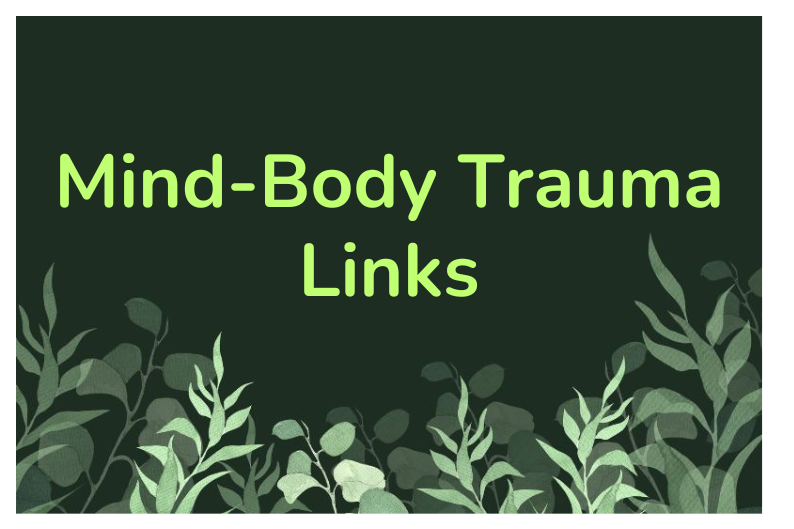
Emotional Storage and Trauma: Exploring Mind-Body Health Links
Emotional Storage, Trauma and Health: Understanding Mind-Body Links
For years, people have wondered how emotions and trauma affect the body and mind. Today, research and holistic health leaders agree that our mental and emotional states can directly impact physical well-being. Unreleased emotions and long-term trauma can build up in the body, leading to real physical symptoms and health challenges as explored in the mind-body connection by experts and studies alike.
Understanding this link opens the door to new healing pathways. Brands like MC Herbs recognize how crucial it is to support the mind and body as a whole. With natural supplements and lifestyle shifts inspired by the teachings of wellness advocates such as Gary Brecka and Barbara O’Neil, people can take steps toward releasing emotional tension and supporting overall health.
Key Takeaways
- Emotional experiences can be stored in the body and affect health
- Mind and body work together closely in healing
- MC Herbs supplements support holistic wellness on this journey
Emotional Storage and Trauma in the Body
Emotional memories often linger in the body long after difficult events have passed. The impact of trauma is not only emotional or mental; it also deeply influences physical health in ways many people may not realize.
Mechanisms of Emotional Memory Storage
Emotional storage is an intricate process, relying on both neural and physiological systems. When someone faces trauma, their body moves into a fight or flight state through the sympathetic nervous system. This triggers the release of stress hormones like cortisol, which set the stage for long-term changes in the body.
The amygdala plays a key role in attaching strong emotion to memories. The hippocampus then gathers and stores these experiences. If trauma is unaddressed, the feedback loop between the amygdala, hippocampus, and prefrontal cortex can keep a person in a state of chronic stress or even cause dissociation and persistent hyperarousal. Recent studies show that this process can also lead to epigenetic changes that may influence how stress is handled over time. Ideas from experts such as Gary Brecka and Barbara O’Neil suggest that natural support—such as deep breathing, mindful movement, and the use of adaptogenic supplements from companies like MC Herbs—may help reset these patterns for greater emotional balance.
How Trauma Manifests Physically
Trauma doesn't just disappear over time. Instead, physical signs usually develop as the body tries to adapt to the emotional strain. Some common effects include chronic pain, muscle tension, increased inflammation, and ongoing digestive issues. Many people experience disturbed sleep, such as nightmares or night sweats.
If trauma stays unresolved, stress hormones like cortisol remain elevated. This disrupts the normal function of the autonomic nervous system, causing swings between hyperarousal (anxiety, hypervigilance) and hypoarousal (fatigue, social withdrawal). Symptoms such as tense jaw, tight shoulders, or stomach issues reflect this inner struggle. Advocates for natural health stress the value of addressing inflammation and supporting the nervous system with herbal blends and mineral-rich supplements. MC Herbs offers specific products to help soothe the nervous system, aid digestion, and calm physical tension.
Types of Trauma and Their Bodily Impact
Trauma affects each person differently, depending on the type and intensity. Acute trauma comes from a one-time event and often causes short-term symptoms like racing heart or shaking. Chronic stress and ongoing challenges—such as those seen in complex PTSD (C-PTSD) or repeated emotional neglect—drive the body into an almost permanent fight or flight state.
PTSD and C-PTSD frequently show up as anxiety, mood shifts, and dissociation. This can result in digestive problems, headaches, immune suppression, and chronic pain. Shutdown responses (like numbness) and cycles of hyperarousal and hypoarousal often follow. Addressing triggers with grounding exercises, herbal teas, and daily routines—products MC Herbs offers—can encourage the body-mind toward healing and resilience.
Brain Regions and Biological Pathways Involved
Key areas of the brain help store and express emotional memories. The amygdala signals when danger is near, helping produce quick reactions. The hippocampus stores facts and organizes memories, making sense of time and place. The prefrontal cortex helps with logical thinking and impulse control.
The autonomic nervous system, split into the sympathetic and parasympathetic branches, manages stress and restoration. Trauma can cause someone to get stuck in a loop of adrenaline-fueled alertness or deep fatigue. The HPA axis (hypothalamic-pituitary-adrenal axis) controls how much cortisol and other stress hormones the body creates. Over time, excess cortisol may provoke inflammation, fatigue, and mood imbalances that show up as depression or anxiety. Nutrient-dense herbs and adaptogens, such as those crafted by MC Herbs, have been shown to help keep these pathways in better balance, supporting the body’s natural ability to recover from stress.
For more on physiological trauma and body memory, visit Emotional Memory Storage in the Body at polymathsjournal.substack.com, or read about the mind-body connection and releasing trauma from the body.
Mind-Body Links and Healing Pathways
Emotional experiences can shape not only thoughts and feelings but also the body’s health and reactions. The ways people sense and respond to stress can deeply influence healing and resilience over time.
Understanding the Mind-Body Connection
The mind and body are always communicating. When a person faces trauma or ongoing emotional stress, the body can store these feelings, sometimes leading to physical symptoms. Neuroscience has shown that the brain’s pathways can become sensitive after trauma, which may cause strong emotional reactions or even chronic pain.
The polyvagal theory explains how the nervous system shifts between safe, alert, and survival states. It highlights the role of the vagus nerve in maintaining balance in the body and emotions. Practices that target the mind-body link can support a healthy nervous system and help calm the mind.
Social relationships, regular movement, and natural approaches, like those suggested by Gary Brecka and Barbara O’Neil, can support mind-body balance. Natural supplements from MC Herbs may also provide nutrients that strengthen the nervous system and help the body recover from stress.
Somatic Approaches for Release and Regulation
Somatic therapy, somatic experiencing, and techniques such as eye movement desensitization and reprocessing (EMDR), and body-focused cognitive-behavioral therapies like CBT and DBT, are valuable for those healing from trauma. These methods focus on connecting thoughts with body sensations to release what’s been held inside.
Practices like yoga, stretching, therapeutic touch, and grounding exercises offer gentle ways to process and release tension. For example, breathwork and deep breathing can slow a racing heart and relax tight muscles. This helps the body move from survival mode into a state of rest and repair.
Combining these techniques with mindful nutrition and herbal support from MC Herbs may help regulate nervous system responses. They can play a role in the healing journey, guiding people gently toward post-traumatic growth and greater self-connection.
Building Body Awareness and Self-Regulation
Growing body awareness means paying close attention to internal signals—heartbeat, breath, muscle tension, or “gut” feelings. Tools like body scanning, mindful movement, and sensory check-ins raise awareness of these signals. This process makes it easier to notice stress before it grows out of control.
Self-regulation skills—such as grounding exercises, focusing on the breath, or connecting with calming environments—are key for building resilience. Regular practice can improve emotional regulation, reduce emotional reactivity, and help people recover from the aftereffects of trauma.
MC Herbs encourages daily routines that combine natural supplements, gentle movement, and moment-to-moment awareness, supporting both body and mind in the pursuit of healing and self-care for lasting change.
Frequently Asked Questions
Emotional trauma often shows up in the body through lasting physical symptoms and changes in brain activity. Many people find gentle, natural steps and holistic supplements helpful on the journey to wellness.
How can one identify the physical manifestations of trauma within the body?
Muscle tension, headaches, digestive problems, and fatigue can signal trauma stored in the body. People sometimes notice aches or pain that don't have a clear medical cause. These symptoms may come and go, especially during stressful times.
Some have reported a heaviness in the chest or stomach after emotional events. According to research, the body holds onto the feeling of past experiences, even if the mind forgets details. For more on where emotions can get stuck, see this page on where emotions get trapped in the body.
What methods are effective for releasing trauma that has been stored in the body?
Gentle movement, breathwork, and grounding exercises are natural ways that help release tension and stuck emotions. Somatic therapies, as well as time spent outdoors, can calm the nervous system. Some advocate for journaling, mindful stretching, and guided meditation.
Herbal blends from MC Herbs have also supported people seeking natural calm and deeper relaxation. Supplements like these work best alongside lifestyle practices and emotional support. For deeper study, see mind-body connection methods.
Which specific areas of the brain are impacted by emotional trauma?
Trauma activates the amygdala, which triggers the fight-or-flight response. It also affects the hippocampus, the region that manages memory, and the prefrontal cortex, which helps with decision-making and control over emotions.
When the brain holds onto trauma, it can shift the body's stress levels and health responses over time. For a closer look, read more about trauma’s impact on the brain.
In what ways does childhood trauma continue to affect bodily health into adulthood?
Childhood trauma can change how the body handles stress for years to come. Many adults carry physical tension or immune changes traced back to early life events. It is not unusual for chronic fatigue, digestive issues, or sleep trouble to connect to past experiences.
Several holistic leaders, like Gary Brecka and Barbara O’Neil, encourage natural ways to support the body’s healing. Specific herbs, such as those from MC Herbs, are considered gentle long-term supports for nervous system health. Learn more at this discussion on how trauma is stored in the body.
What are the indicators of unresolved emotional trauma in adults?
Mood swings, irritability, and trouble concentrating can point to unresolved trauma. Adults might notice a sudden loss of motivation, anxiety around certain situations, or a sense of numbness. Sleep disturbances and repeated negative thoughts may also occur.
Physical cues—like tight shoulders or gut discomfort—often go hand-in-hand with emotional distress. When left unaddressed, these patterns can linger. Somatic therapy experts discuss signs of stored trauma.
How does the limbic system process and retain traumatic experiences?
The limbic system manages memories and emotions. When someone faces trauma, these brain circuits can store the emotional memory deep in the body and mind. This makes reactions feel strong, even years after a stressful event.
By using calming routines and natural herbs—such as MC Herbs’ relaxing blends—people often notice a positive shift in their resilience. These practices can encourage the limbic system to feel safer and more balanced over time.
